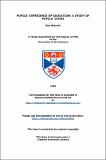Files in this item
Pupils' experiences of education : a study of pupils' views
Item metadata
| dc.contributor.advisor | Quinault, Frank | |
| dc.contributor.author | Warner, Sue | |
| dc.coverage.spatial | 313, [45] p. | en_US |
| dc.date.accessioned | 2016-01-12T13:09:26Z | |
| dc.date.available | 2016-01-12T13:09:26Z | |
| dc.date.issued | 1985 | |
| dc.identifier.uri | https://hdl.handle.net/10023/8005 | |
| dc.description.abstract | This thesis is primarily concerned with the experiences and opinions of education held by pupils in late secondary school and by university students. Over several years, a small group of highly able pupils were interviewed about their experiences of school and university. Their comments were supplemented by interviews with and questionnaire studies of other age-groups of pupils and students. The research has two central emphasises. Firstly, it represents an attempt to increase our understanding of intellectual development in adolescence. At present, there is no coherent theory of adolescent intellectual activity, and little research or evidence on which to build one. Pupil and student experiences of post-compulsory education have been central to this study and it is hoped that they will make a contribution to building up a body of knowledge on which understanding can be enhanced and a theory developed. The second, and related aspect of the research concerns educational practice and its influence on pupils and students. Educational changes are not made on the basis of solid evidence or theory, rather, they are based upon commonsense notions and our own experiences of education. In Scottish education, sixth year pupils face a radical change in the ways in which they are taught and expected to study - the Certificate of Sixth Year Studies (CSYS). Through independent study and project work, CSYS aims to increase the 'educational maturity' of pupils. Pupils' responses to CSYS, and its effects on how and why they study at school and university form the central focus of this thesis. The thesis examines in detail how pupils and students react to changes in their academic environment, both within school and transferring to university. Finally, the implications of the research are discussed in terms of adolescent development, educational innovation, and on a more basic level, how pupils, students, teachers and lecturers can better understand and improve the experience and effectiveness of post-compulsory education. | en_US |
| dc.language.iso | en | en_US |
| dc.publisher | University of St Andrews | |
| dc.rights | Creative Commons Attribution-NonCommercial-NoDerivatives 4.0 International | |
| dc.rights.uri | http://creativecommons.org/licenses/by-nc-nd/4.0/ | |
| dc.title | Pupils' experiences of education : a study of pupils' views | en_US |
| dc.type | Thesis | en_US |
| dc.type.qualificationlevel | Doctoral | en_US |
| dc.type.qualificationname | PhD Doctor of Philosophy | en_US |
| dc.publisher.institution | The University of St Andrews | en_US |
This item appears in the following Collection(s)
Except where otherwise noted within the work, this item's licence for re-use is described as Creative Commons Attribution-NonCommercial-NoDerivatives 4.0 International
Items in the St Andrews Research Repository are protected by copyright, with all rights reserved, unless otherwise indicated.


